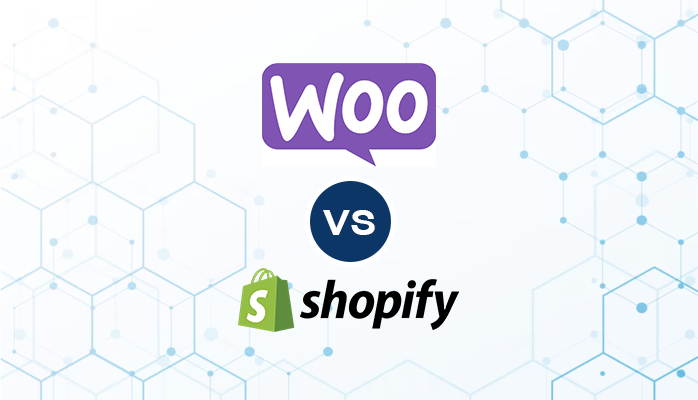WooCommerce vs Shopify: Two industry titans, WooCommerce and Shopify, are battling for supremacy in the lucrative e-commerce market. But in our opinion, Shopify triumphs because of its simplicity, premium-calibre-free themes, dependability, and honest pricing. WooCommerce, however, stands out as a strong competitor and receives excellent marks for its minimal entry requirements, simple WordPress integration, cost-effectiveness, and superb customizability.
You may choose which platform is deserving of hosting your online business by reading our head-to-head comparison before we continue.
On ease of use, compare WooCommerce and Shopify
For non-technical users or small businesses without the funding to engage technical personnel, Shopify is typically more straightforward to use than WooCommerce. All the technical aspects of running an online store are taken care of for you because Shopify is a hosted platform. You don’t have to worry about server maintenance, security, software upgrades, or backups because it handles these issues.
While WooCommerce is a self-hosted platform, you mustmanage your hosting, security, and software upgrades. WooCommerce does offer tools and documentation to assist you in setting up your online store, but it might be more complex and time-consuming than utilising Shopify.
Inventory management: WooCommerce vs Shopify
By defining stock levels for each product, WooCommerce allows you to control your inventory. Inventory tracking and low-stock alerts are also available. You must utilise a third-party plugin or solution to manage your inventory because it needs an integrated system.
This should be fine since there are several third-party inventory management plugins for WooCommerce. You can handle orders, keep track of your inventory levels, and sync it with different sales channels with these plugins.
A built-in inventory management system in Shopify makes tracking inventory and managing stock levels simple. You may choose stock levels for each product and sign up for low-stock alerts.
Features of WooCommerce vs Shopify for Sales
WooCommerce provides several sales capabilities, including product variants, coupons, and discounts. It also combines several marketing platforms, including social media and email marketing.
Using third-party plugins is necessary for sophisticated sales features, such as abandoned cart recovery and upselling, which can add to the cost.
A wide range of sales capabilities, such as abandoned cart recovery, upselling, product variants, coupons, and discounts, are integrated into the Shopify platform.
On integrations, Woocommerce vs Shopify
WooCommerce allows for integratingseveral free plugins and extensions, most of which have affordable alternatives. In addition, a sizable developer community is working on new connectors and maintaining existing ones because WooCommerce is open-source. However, setting up and maintaining some integrations could requiremore excellent technical expertise.
Becausemanyof Shopify’s integrations are already included in the platform, they are simpler to set up and manage. Additional connections are also available through Shopify’s app store. However, some of them could have a fee attached.
On marketing tools, compare WooCommerce and Shopify
With the help of several plugins and extensions, WooCommerce provides a selection of marketing tools. These platforms offer possibilities for affiliate marketing, email marketing, social media marketing, and other forms of marketing.
Furthermore, WooCommerce provides a selection of affiliate marketing plugins that enable customers to build and manage affiliate networks to increase sales.
To assist users in promoting their online businesses, Shopify also provides several integrated marketing tools. That includes customer involvement, email marketing, social media advertising, and the capacity to send automated emails depending on user behaviour. In their app store, they also provide access to various marketing applications, including possibilities for SMS marketing, referral programmes, and loyalty schemes.
SEO for WooCommerce vs. Shopify
Because WooCommerce has more control over SEO factors like metadata, meta descriptions, URLs, and site structure—all of which are crucial for SEO optimisation—because WordPress is recognised for having good search engine optimisation skills. Additionally, WooCommerce is open-source, allowing users to modify the code to improve the SEO of their business. For instance, you may speed up the loading process using code optimisation, which can boost your search engine results.
However, Shopify now offers a variety of SEO-friendly tools and has made substantial recent changes to its SEO capabilities. It features its analytics capabilities and the ability to interface with Google Analytics.
Costs of WooCommerce vs Shopify
Depending on the hosting company and the quality of service needed, hosting and domain registration for WooCommerce can range in price from a few dollars to several hundred dollars per month. WooCommerce also provides a vast selection of premium and free extensions that may enhance the platform’s functionality by adding features like shipping choices, payment gateways, and marketing tools.
Contrarily, Shopify provides a selection of price options based on requirements. Hosting, domain registration, and several other fundamental capabilities are all part of the entry-level package, which costs $29 per month. Shopify also provides a selection of premium themes and applications that may be used to tailor the platform further.
Scalability of WooCommerce vs Shopify
It scales more effectively because Shopify is a fully hosted platform intended to manage considerable traffic and transaction volumes. You can concentrate on developing your business without worrying about scalability problems since Shopify handles the technical parts of hosting and maintenance.
The correct infrastructure and optimisation may also help WooCommerce expand, but doing so necessitates more technical expertise and work.
Platform model of WooCommerce vs Shopify
Shopify is a closed platform, whereas WooCommerce is an open-source platform. It follows that anybody can alter and share WooCommerce’s source code as it is publicly available.
Due to WooCommerce’s open-source nature, a sizable community of programmers and users contribute to its development. This implies that errors are frequently discovered and promptly corrected, and new features and plugins are consistently introduced.On the other hand, Shopify’s restricted nature offers certain benefits. Shopify is a very safe and dependable platform because it is a closed system. Shopify is in charge of running all upgrades and upkeep for the platform. This means you won’t have to worry about maintaining your hosting environment or keeping your applications up to date.
Conclusion:
For starting an online business, WooCommerce and Shopify are both excellent options. Now that you’ve decided between WooCommerce and Shopify, it’s time for the last judgement to help you decide. Depending on your preferences and ability level.
Choose WooCommerce if you want a solution with practical SEO features, customizability, flexible scalability, and superior design control or if your primary marketing goal is to drive visitors via content for search engines. Choose Shopify if you’re new to eCommerce, prefer to avoid stress about technical details or complex layout functions, want the highest level of security, and want devoted assistance.
Before we wrap up, we encourage you to look closely at our thorough comparison of WooCommerce vs Shopify.











